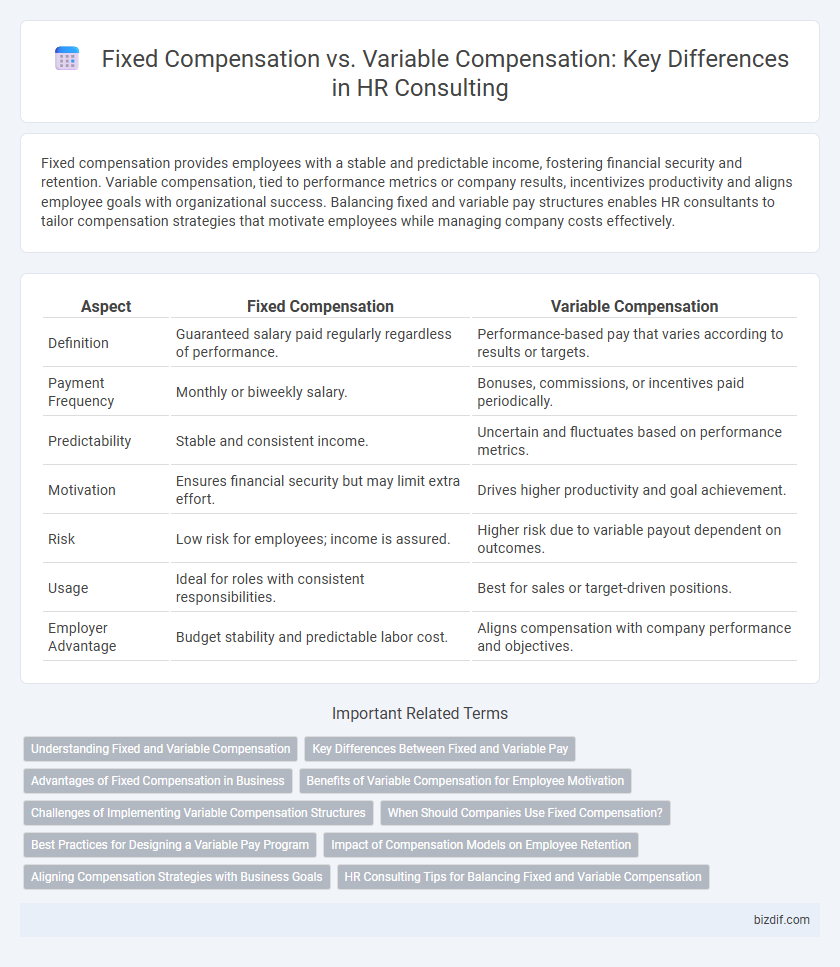Fixed compensation provides employees with a stable and predictable income, fostering financial security and retention. Variable compensation, tied to performance metrics or company results, incentivizes productivity and aligns employee goals with organizational success. Balancing fixed and variable pay structures enables HR consultants to tailor compensation strategies that motivate employees while managing company costs effectively.
Table of Comparison
| Aspect | Fixed Compensation | Variable Compensation |
|---|---|---|
| Definition | Guaranteed salary paid regularly regardless of performance. | Performance-based pay that varies according to results or targets. |
| Payment Frequency | Monthly or biweekly salary. | Bonuses, commissions, or incentives paid periodically. |
| Predictability | Stable and consistent income. | Uncertain and fluctuates based on performance metrics. |
| Motivation | Ensures financial security but may limit extra effort. | Drives higher productivity and goal achievement. |
| Risk | Low risk for employees; income is assured. | Higher risk due to variable payout dependent on outcomes. |
| Usage | Ideal for roles with consistent responsibilities. | Best for sales or target-driven positions. |
| Employer Advantage | Budget stability and predictable labor cost. | Aligns compensation with company performance and objectives. |
Understanding Fixed and Variable Compensation
Fixed compensation guarantees employees a stable income through consistent salaries or wages, fostering financial security and predictability. Variable compensation includes performance-based pay such as bonuses, commissions, or incentives, designed to motivate and reward individual or team achievements. Effective HR consulting balances these elements to align employee goals with organizational performance, enhancing retention and productivity.
Key Differences Between Fixed and Variable Pay
Fixed compensation provides employees with a stable, predictable income through set salaries or wages, ensuring financial security and budget consistency for employers. Variable compensation, such as bonuses, commissions, or profit-sharing, is performance-based and directly linked to individual, team, or company results, incentivizing higher productivity and goal achievement. The key difference lies in risk distribution: fixed pay minimizes income fluctuation for employees, while variable pay aligns rewards with organizational performance, fostering motivation and accountability.
Advantages of Fixed Compensation in Business
Fixed compensation offers businesses predictable payroll expenses, facilitating accurate budgeting and financial planning. It enhances employee satisfaction by providing income stability, which can reduce turnover and improve workforce retention. Consistent fixed pay simplifies compliance with labor laws and minimizes disputes related to salary discrepancies.
Benefits of Variable Compensation for Employee Motivation
Variable compensation directly links employee rewards to performance, fostering a culture of accountability and high achievement. Incentive-based pay structures enhance motivation by providing clear, measurable goals and immediate rewards, increasing employee engagement and productivity. This approach aligns individual objectives with organizational success, driving sustained growth and competitive advantage.
Challenges of Implementing Variable Compensation Structures
Implementing variable compensation structures poses challenges such as accurately aligning incentives with performance metrics and ensuring transparency to maintain employee trust. Organizations must invest in robust performance measurement systems to avoid disputes and inconsistencies that undermine motivation. Balancing complexity with clarity is essential to prevent confusion and administrative burdens in rewarding employees effectively.
When Should Companies Use Fixed Compensation?
Companies should use fixed compensation to ensure consistent income stability for employees, which supports long-term financial planning and enhances job security. Fixed pay is ideal in roles with routine tasks or where performance outcomes are less directly measurable, such as administrative or operational positions. This compensation structure fosters employee loyalty and reduces turnover by providing reliable earnings regardless of short-term business fluctuations.
Best Practices for Designing a Variable Pay Program
Designing a variable pay program requires aligning incentive structures with organizational goals to drive employee performance and engagement effectively. Emphasizing clear performance metrics, transparency in payout calculations, and regular communication ensures employees understand and trust the reward system. Incorporating flexibility to adapt to market trends and individual roles enhances motivation while maintaining cost control in compensation strategy.
Impact of Compensation Models on Employee Retention
Fixed compensation provides employees with financial stability and predictability, which enhances job satisfaction and reduces turnover rates. Variable compensation, such as bonuses and commissions, incentivizes performance but may lead to uncertainty that can impact long-term retention negatively if not balanced properly. Combining both models strategically aligns employee motivation with business goals, fostering commitment and improving overall retention.
Aligning Compensation Strategies with Business Goals
Fixed compensation ensures predictable financial commitments for organizations, supporting budget stability and employee retention. Variable compensation motivates performance by linking rewards directly to achieving business goals, driving innovation and productivity. Optimizing the balance between fixed and variable pay aligns employee incentives with company objectives, enhancing overall organizational effectiveness and profitability.
HR Consulting Tips for Balancing Fixed and Variable Compensation
Balancing fixed and variable compensation requires HR consulting professionals to analyze organizational goals and employee performance metrics carefully. Implementing a strategic mix enhances motivation while controlling labor costs, integrating base salary stability with performance-based incentives. Leveraging data-driven insights helps tailor compensation packages that align employee behavior with company objectives, driving sustained productivity and retention.
Fixed Compensation vs Variable Compensation Infographic

 bizdif.com
bizdif.com